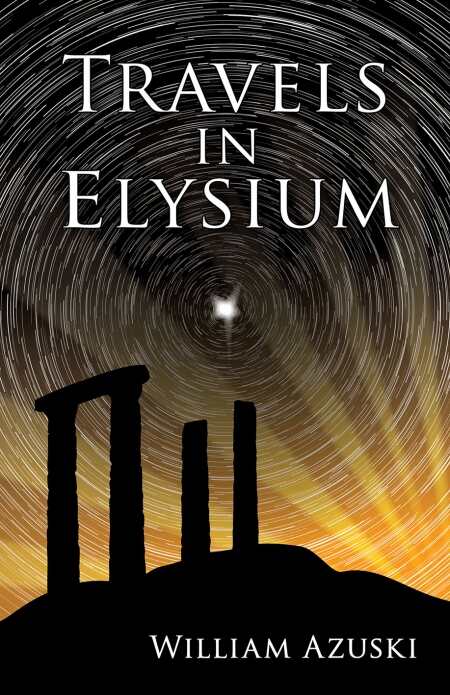Travels in Elysium
Legends come alive at a leisurely pace as characters search for treasures hinted at in ancient texts.
“It appears Professor Huxley is either going to make people fabulously rich or unleash the Devil,” quips one character in describing the towering, obsessive, and possibly quite mad leader of an expedition seeking to unearth the fabled lost city of Atlantis in William Azuski’s engrossing novel, Travels in Elysium. There is more truth and prescience in that offhand remark than the speaker could imagine, and it is such unsubtle teasers that continue to draw the reader, like the crazed archaeologist himself, deeper and deeper into the story.
Azuski’s novel begins much like any other tale of a search for knowledge and treasures hinted at in legend, mythology, and ancient texts. But as the author’s young hero, Nicholas, slowly begins to discover, this is no ordinary dig and Professor Huxley is no ordinary archaeologist. More obsessed Captain Ahab than curious Indiana Jones, Huxley is on a mission that is as metaphysical as it is historical in nature.
At the surface, the novel is centered on a search for “Atlantis: the island that has seduced, perplexed and obsessed human minds for more than two millennia,” and which “has spawned more theories than fleas on a slum cat,” as Huxley explains to his young protégé. As Nicholas and the reader slowly discover, however, there is more afoot on the island of Santorini than finding proof of Plato’s advanced, utopian, yet ultimately doomed and lost civilization. While saying more would spoil the story, suffice it to say that there is murder, mystery, mythology, metaphysics, and mayhem aplenty, albeit presented at a pace that proceeds not much faster than an archaeological dig.
Azuski is obviously enraptured as much by the ancient myth as he is by the modern Greek island and its people, and wants to take his time, languishing lazily like Santorini’s villagers in the Aegean sun. He is not in a rush to tell the story, and while readers might wish he would get on with it, they can enjoy his poetic descriptions of the scenery and the characters in the meantime. Even minor characters are brought to life by Azuski, who has Nicholas say of his beautiful coworker Maria, “Whenever I saw her, I could hardly breathe, hardly string two words together.” Many authors might leave it at that, but Azuski has Nicholas go on to sigh, “I imagined how she slept. How it would be to fit the curve of her back, the back of her legs.”
As good as his prose is and as interesting as the story becomes, Travels in Elysium is overly long. There is a great deal of repetition and many sidebars into the metaphysical, as well as scenes that might be dreams or hallucinations caused by sulphuric gases rising from an old volcano. Neither the author nor his characters provide a definitive answer to whether those mysterious passages are real or imagined.
Azuski has provided an arch-nemesis for Huxley, but the professor is arguably his own worst enemy. As Nicholas remarks, “how else would you describe a man who despises fate yet believes himself destined for great things?”
Although it slows down in the middle before getting its second wind, this book is a must read for any fiction fan with an interest in Greek history, archaeology, or mythology or who, like Huxley (and Azuski), dream of Elysium or want to believe in the legend of Atlantis.
Reviewed by
Mark McLaughlin
Disclosure: This article is not an endorsement, but a review. The publisher of this book provided free copies of the book and paid a small fee to have their book reviewed by a professional reviewer. Foreword Reviews and Clarion Reviews make no guarantee that the publisher will receive a positive review. Foreword Magazine, Inc. is disclosing this in accordance with the Federal Trade Commission’s 16 CFR, Part 255.


